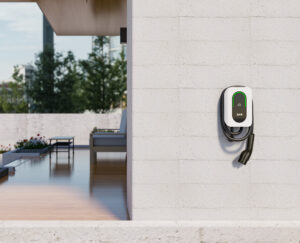
Vehicle-to-Grid (V2G): The Future of EV Charging and a Smarter Energy Grid
Vehicle-to-Grid technology is redefining the role of electric vehicles, turning them into dynamic energy assets that benefit drivers, utilities, and the planet.

In many save energy certifications, ENERGY SATR, a save energy certification co-launched by the United States Environmental Protection Agency (EPA) and the Department of Energy(DOE), has been an important consultation for consumers selecting a high-efficiency product. In this blog, we’ll explore what ENERGY STAR-certified EV chargers are and their advantages in protecting the environment.
As mentioned in the previous introduction, ENERGY SATR is a save energy certificate plan co-launched by the EPA and the DOE. It aims to help consumers identify and select high-efficiency production.
All ENERGY STAR certified products passed a series of strict tests. The authentication marks not only be applied to household appliances but also to various commercial appliances, such as HVAC systems 、EV chargers and computers.
ENERGY STAR certified EV charger has lower energy consumption and a higher energy-efficient use rate. These chargers adopt advanced technology and design, ensuring a highly electric transform efficiency rate.
Such as a traditional EV charger, an ENERGY STAR-certified EV charger has lower energy consumption in Idle Mode, and it doesn’t dissipation power. This energy design not only helps EV drivers save electric costs but also makes a contraction for reducing energy waste.
The below picture is Joint EVH007’s certified information download from the EVERGY STAR website. You can see the dissipation of power in different situations and times.
Electric cars are a green transport tool, and ENERGY STAR certified further step to improve environmental protection. It’s good for reducing carbon emissions.
Although ENERGY STAR certified EV chargers have a higher purchase cost, they can save owners money on their electricity bills with lower energy consumption over time.
ENERGY STAR certified EV chargers usually use more advanced technologies and materials to ensure long-term stability and reliability. These chargers not only save energy but also keep their excellent performance under high loads, reducing the potential for trouble and extending the lifespan of the equipment.
When selecting an ENERGY STAR certified EV charger, owners can make a more intelligent decision based on the below tips:
Every ENERGY STAR certified clearly show the “ENERGY STAR” mark on its label. This mark is key to making sure the product meets high-efficiency standards, so check for it when buying.
ENERGY STAR certified EV chargers have good performance. consumers can look at the power output and charging efficiency to judge its energy efficiency. Some products offer detailed energy efficiency data to help consumers make choices.
There are various types of EV chargers on the market, including home and commercial chargers.Based on their needs, consumers can choose the right charger type (such as charging frequency, vehicle type, installation location, and so on). Meanwhile, choosing an ENERGY STAR-certified charger can ensure lower energy consumption and higher charging efficiency.
It is important to consider not only the energy efficiency of the charger but also the after-sales service and warranty policy. Choosing a brand that offers good customer service and a long warranty will ensure that if you have any problems during use, you can get support and solutions in a time-efficient manner.
ENERGY STAR-certified EV chargers not only provide EV owners with an efficient charging experience but also help reduce energy waste and environmental pollution. When choosing an EV charger, it’s a priority to buy ENERGY STAR certified EV Charger, that not only has lower electricity bills but also helps protect the environment.As the energy-saving technology improves, ENERGY STAR certification will become an important standard for EV chargers, and promoting green and sustainable energy use.

Vehicle-to-Grid technology is redefining the role of electric vehicles, turning them into dynamic energy assets that benefit drivers, utilities, and the planet.

At this ACT Expo, Joint Tech will unveil its latest advanced commercial Level 2 charging solution, designed to enhance the user experience. Meanwhile,powered by new technology, our commercial chargers effectively address multiple challenges encountered in real-world applications.

The new tariffs imposed by the United States have once again caused global economic tension.In order to respond to the impact on the global supply chain, Joint new factory in Malaysia offers favorable tax rates.